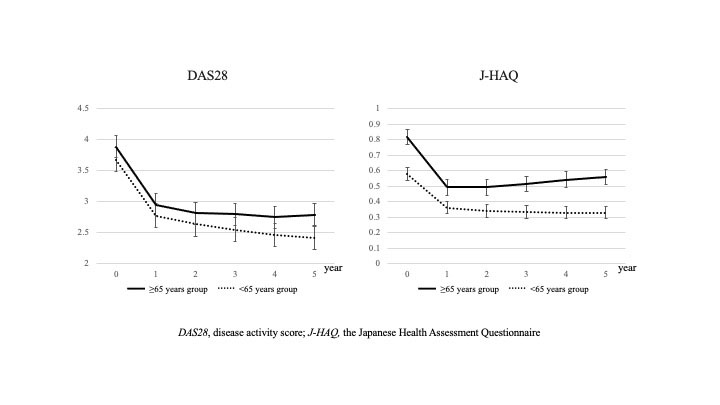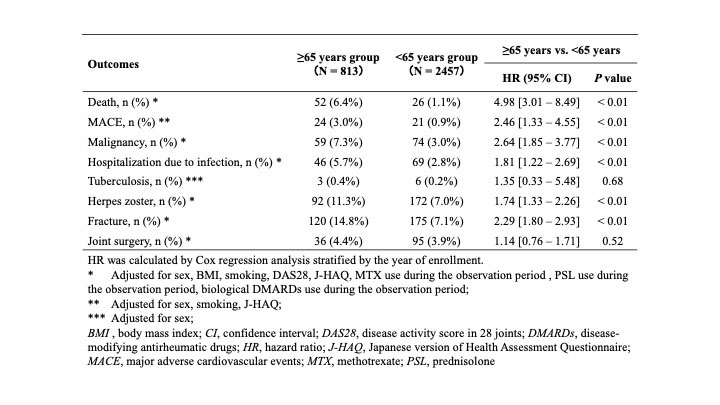Session Information
Session Type: Poster Session A
Session Time: 1:00PM-3:00PM
Background/Purpose: The number of elderly patients with rheumatoid arthritis (RA) has been constantly increasing. As of December 2021, 50.3% of the patients with RA who participated in the Institute of Rheumatology, Rheumatoid Arthritis (IORRA) cohort were 65 years or older. In patients with elderly-onset RA, the decline in activities of daily living (ADL) due to RA has significant impact on their vital prognosis. Early control of disease activity of RA can contribute to maintenance of ADL and prevention of the RA progression. However, special consideration should be given to management of RA in the elderly patients because of the increased frequency of comorbidities and adverse events. The actual status and sequelae of medical treatment for patients with elderly-onset early RA have not been clarified in the real world. In this study, we longitudinally investigated the outcomes of treatment and unfavorable clinical events in patients with elderly-onset early RA in a clinical setting.
Methods: Among the patients with RA enrolled in the IORRA from 2000 to 2016, the patients with early RA (disease duration of RA within 2 years) who were aged ≥65 years (≥65 years group) and those who were < 65 years (< 65 years group) were enrolled in this study. The primary endpoint was changes in the Disease Activity Score in 28 joints (DAS28) and Japanese version of Health Assessment Questionnaire (J-HAQ) for 5 years. The secondary endpoint was incidence rates of pre-specified adverse events (death, major adverse cardiovascular event [MACE], malignancy, hospitalization due to infection, herpes zoster, and fracture) up to 5 years. Association of the age group with each event was assessed using Cox regression analysis stratified by the year of enrollment.
Results: There were 813 patients in the ≥65 years group (mean age 72.0 years, female 72.0%, mean disease duration of RA 0.78 years, DAS28 3.88, J-HAQ 0.82, RF-positive 68.1%, ACPA-positive 64.5%) and 2,457 patients in < 65 years group (mean age 48.3 years, female 83.7%, RA disease duration 0.77 years, DAS28 3.67, J-HAQ 0.58, RF-positive 75.4%, ACPA-positive 79.1%). The proportions of patients using methotrexate and biological disease modifying antirheumatic drugs were 70.6% and 8.4% in the ≥65 years group, respectively, and 81.6% and 19.4% in < 65 years group, respectively, during the observation period. Mean DAS28 and J-HAQ improved promptly after 1 year of enrollment in both groups. Mean DAS28 and J-HAQ in the < 65 years group were < 2.6 and < 0.5, respectively, on and after Year 2, but in ≥65 years group, mean DAS28 remained >2.6 and mean J-HAQ deteriorated after Year 2 (Figure 1). The incidence rates of death, MACE, malignancy, hospitalization due to infection, herpes zoster and fracture were significantly higher in the ≥65 years group compared to < 65 years group (Table 1).
Conclusion: Our study indicated that patients with elderly-onset early RA could achieve LDA although it was difficult for these patients to achieve clinical remission and maintain long-term functional remission. In addition, patients with elderly-onset early RA have a higher risk for unfavorable clinical events than those with younger-onset early RA.
To cite this abstract in AMA style:
Sugitani N, Tanaka E, Inoue E, Watanabe K, Abe M, Sugano E, Saka K, Ochiai M, Yamaguchi R, Ikari K, Harigai M. Real World Evidence of Treatment Effectiveness and Unfavorable Clinical Events for Elderly-onset Early Rheumatoid Arthritis in Japan: Results from the IORRA Study [abstract]. Arthritis Rheumatol. 2022; 74 (suppl 9). https://acrabstracts.org/abstract/real-world-evidence-of-treatment-effectiveness-and-unfavorable-clinical-events-for-elderly-onset-early-rheumatoid-arthritis-in-japan-results-from-the-iorra-study/. Accessed .« Back to ACR Convergence 2022
ACR Meeting Abstracts - https://acrabstracts.org/abstract/real-world-evidence-of-treatment-effectiveness-and-unfavorable-clinical-events-for-elderly-onset-early-rheumatoid-arthritis-in-japan-results-from-the-iorra-study/


